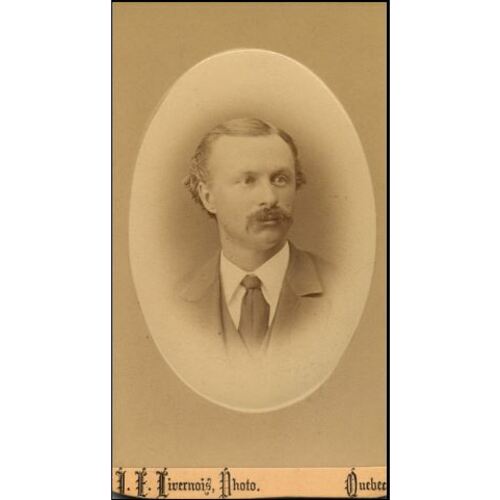![Titre : Praxède (Panet ?) Larue
Créateur : J.E. Livernois Photo. Québec
Date : [Vers 1880]
Lieu de conservation : BAnQ Québec Original title: Titre : Praxède (Panet ?) Larue
Créateur : J.E. Livernois Photo. Québec
Date : [Vers 1880]
Lieu de conservation : BAnQ Québec](/bioimages/w600.14632.jpg)
Source: Link
LARUE, PRAXÈDE (baptized François-Xavier-Praxède), physician and politician; b. 2 Sept. 1823 in Saint-Antoine-de-Tilly, Lower Canada, son of Damase Larue, a notary, and Marie des Anges Lefebvre; m. 2 May 1859 Henriette Couture in Saint-Augustin-de-Desmaures, Lower Canada, and they had eight children, of whom five died in infancy; d. there 29 Nov. 1902 and was buried in the parish cemetery on 3 December.
Unlike his father and his grandfather François-Xavier Larue*, who were both notaries, Praxède Larue chose to become a physician after completing his education at the Petit Séminaire de Québec. He obtained his licence to practise medicine on 9 Sept. 1844, and that year became the first doctor to establish himself in Saint-Augustin-de-Desmaures. From the very beginning, his willingness to travel far beyond its boundaries to care for the sick earned him a fine reputation. Because he was concerned about local sanitary conditions, he campaigned to have the public highway macadamized and foul-smelling stables demolished.
With his high standing in the community and the prestige of his profession, Larue was elected to the Quebec Legislative Assembly in 1867 as a Conservative member for Portneuf. He was re-elected in 1871 and 1875. His platform called for improved sanitation, colonization of uncultivated land, public education, and progress and planning in agriculture. Because he represented a rural riding, he was particularly interested in farming and settlement. Along with many of his contemporaries he believed that a forward-looking, intelligent colonization program would develop Quebec’s resources, secure the well-being of settlers, and counter the emigration and rural exodus taking place. Larue was the founding president of the Société de Colonisation du Comté de Portneuf. A member of the standing committee on agriculture, immigration, and colonization, in the 1869–70 session he introduced a motion in the assembly instructing the committee “to look into the most appropriate means to popularize and disseminate agricultural knowledge” for the benefit of farmers and to make appropriate recommendations.
Larue was also involved in public health matters, and as chairman of the Legislative Assembly’s select committee on statistics related to health and mortality, he requested a report on the coroners’ inquests held in Quebec since confederation. He got a bill on vital statistics passed in 1875 and made recommendations on burials during epidemics. Faced with the rise of an anti-vaccination movement under the leadership of Dr Joseph Emery-Coderre*, Larue drew on his experience as a physician to defend compulsory vaccination, insisting it was pointless to call the procedure in question. He was a member of a select committee that brought forward a bill, passed in 1876, to establish the College of Physicians and Surgeons of the Province of Quebec and set the rules for the practice of medicine.
Larue’s outlook was conservative and he had strong reservations about introducing the secret ballot, which the Liberals called for in 1875. He contended that since the majority of voters in rural ridings were independent and thus not subject to undue influence, it would be humiliating for them to have to vote in secret. On 26 Feb. 1885 Larue was appointed legislative councillor for the division of La Salle. The Legislative Council benefited from his parliamentary experience until 29 June 1896, when he resigned. He was succeeded by his cousin, Vildebon-Winceslas Larue.
Larue was a cultured man with a great interest in literature. While still a medical student, he became one of the founders of the Société Canadienne d’Études Littéraires et Scientifiques, established at Quebec on 4 Oct. 1843, and he remained a member until his death. His concern for good French was noted by his contemporaries, who thought he expressed himself better than anyone else in the Legislative Assembly.
Both as physician and as politician, Praxède Larue was regarded as a reasonable, energetic, and independent-minded man. He won the respect and admiration of his fellow citizens, and on 17 Feb. 1895 they paid him a glowing tribute as he celebrated the 50th anniversary of his entry into medical practice.
AC, Québec, État civil, Catholiques, Saint-Augustin-de-Desmaures (Québec), 3 déc. 1902. ANQ-Q, CE1-17, 2 mai 1859; CE1-94, 3 sept. 1823. L’Événement, 4 déc. 1902. A[uguste] Achintre, Manuel électoral; portraits et dossiers parlementaires du premier Parlement de Québec (Montréal, 1871). A[uguste] Béchard, Histoire de la paroisse de Saint-Augustin (Portneuf) (Québec, 1885). “Chronique et nouvelles scientifiques,” L’Union médicale, 16 (1887): 503. M. Hamelin, Premières années du parlementarisme québécois. J. M[acP.] Le Moine, Saint-Augustin et son médecin: l’hon. Praxède Larue (Québec, 1895). “Nouvelles médicales,” L’Union médicale, 4 (1875): 575. Qué., Assemblée Législative, Débats, 1867–78; Statuts, 1867–78. P.-G. R[oy], “La famille Larue,” BRH, 45 (1939): 65–71. RPQ. Gustave Turcotte, Le Conseil législatif de Québec, 1774–1933 (Beauceville, Qué., 1933).
Cite This Article
Monique Leclerc-Larochelle, “LARUE, PRAXÈDE (baptized François-Xavier-Praxède),” in Dictionary of Canadian Biography, vol. 13, University of Toronto/Université Laval, 2003–, accessed December 31, 2025, https://www.biographi.ca/en/bio/larue_praxede_13E.html.
The citation above shows the format for footnotes and endnotes according to the Chicago manual of style (16th edition). Information to be used in other citation formats:
| Permalink: | https://www.biographi.ca/en/bio/larue_praxede_13E.html |
| Author of Article: | Monique Leclerc-Larochelle |
| Title of Article: | LARUE, PRAXÈDE (baptized François-Xavier-Praxède) |
| Publication Name: | Dictionary of Canadian Biography, vol. 13 |
| Publisher: | University of Toronto/Université Laval |
| Year of publication: | 1994 |
| Year of revision: | 1994 |
| Access Date: | December 31, 2025 |



